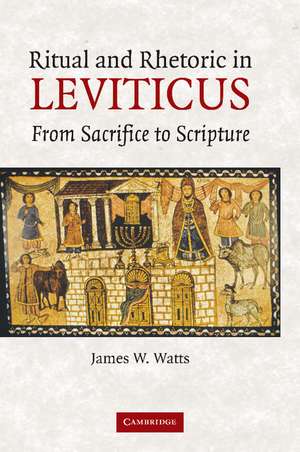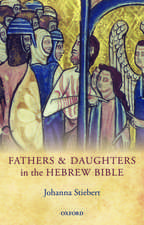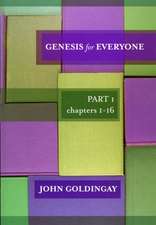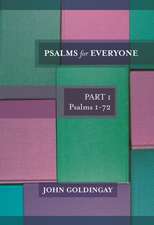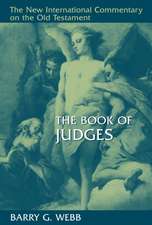Ritual and Rhetoric in Leviticus: From Sacrifice to Scripture
Autor James W. Wattsen Limba Engleză Paperback – 3 oct 2012
| Toate formatele și edițiile | Preț | Express |
|---|---|---|
| Paperback (1) | 336.30 lei 6-8 săpt. | |
| Cambridge University Press – 3 oct 2012 | 336.30 lei 6-8 săpt. | |
| Hardback (1) | 693.69 lei 6-8 săpt. | |
| Cambridge University Press – iul 2007 | 693.69 lei 6-8 săpt. |
Preț: 336.30 lei
Nou
Puncte Express: 504
Preț estimativ în valută:
64.36€ • 69.88$ • 54.06£
64.36€ • 69.88$ • 54.06£
Carte tipărită la comandă
Livrare economică 22 aprilie-06 mai
Preluare comenzi: 021 569.72.76
Specificații
ISBN-13: 9781107407954
ISBN-10: 1107407958
Pagini: 278
Ilustrații: black & white illustrations
Dimensiuni: 152 x 229 x 16 mm
Greutate: 0.41 kg
Editura: Cambridge University Press
Colecția Cambridge University Press
Locul publicării:New York, United States
ISBN-10: 1107407958
Pagini: 278
Ilustrații: black & white illustrations
Dimensiuni: 152 x 229 x 16 mm
Greutate: 0.41 kg
Editura: Cambridge University Press
Colecția Cambridge University Press
Locul publicării:New York, United States
Cuprins
1. Introduction: ritual text and ritual interpretation; 2. The rhetoric of ritual instruction; 3. The rhetoric of burnt offerings; 4. The rhetoric of sin, guilt and ritual offerings; 5. The rhetoric of ritual narrative; 6. The rhetoric of atonement; 7. The rhetoric of priesthood; 8. The rhetoric of sacrifice; 9. The rhetoric of scripture; Bibliography; Index of biblical citations; Index of other ancient literature; Index of authors; Index of subjects.
Recenzii
Review of the hardback: 'Ritual and Rhetoric in Leviticus is a lively, very readable, and clear exposition of a scholarly approach to biblical material that Watts has pioneered in the field of biblical studies. This book is indeed a timely contribution to understanding the book of Leviticus, a body of texts that continues to receive a great deal of attention from so many different standpoints.' Calum Carmichael, Cornell University
Review of the hardback: 'Though Leviticus might not seem important at first glance, it has been the focus of several major publications recently. In addition, it is a highly fraught issue for Christians and Jews. Watts provides an original approach to many issues, offering a significant alternative to recent treatments. This book is a very exciting, often original, well-produced and thorough study of some important questions.' David Carr, Union Theological Seminary
Review of the hardback: 'Watts skilfully carries out his fresh reading of Leviticus with penetrating attention to persuasive effects of literary features (e.g., genre conventions, repetitive structures, negative stipulations, terminology); robust interaction with secondary sources and comparative materials; and excellent writing that is engaging, precise, and concise. With finely tuned logic, Watts builds his case from critiques of existing ritual interpretations to identification of rhetoric supporting a priestly monopoly to the breathtaking conclusion that these ritual instructions at the heart of the Pentateuch legitimated authority of the whole collection of writings and played the pivotal role in elevating it to the status of scripture.' Roy E. Gane, The Catholic Biblical Quarterly
Review of the hardback: '… lively and stimulating …' Journal for the Study of the Old Testament
Review of the hardback: 'Watts' movement between the 'original' rhetorical setting and contemporary issues arising from the study of Leviticus makes for an engaging read, as well as moments of self-reflection about one's own rhetorical use of texts.' The Expository Times
Review of the hardback: 'This brief review cannot do justice to the wealth of careful argumentation and textual analysis contained in this volume. I recommend it strongly as a study of ritual texts in Leviticus, and more generally as a work demonstrating the value of rhetorical analysis of biblical ritual texts, and as a study of the ideology and literary activity of ancient Israel's Aaronide priesthood.' AJS Review
Review of the hardback: 'Though Leviticus might not seem important at first glance, it has been the focus of several major publications recently. In addition, it is a highly fraught issue for Christians and Jews. Watts provides an original approach to many issues, offering a significant alternative to recent treatments. This book is a very exciting, often original, well-produced and thorough study of some important questions.' David Carr, Union Theological Seminary
Review of the hardback: 'Watts skilfully carries out his fresh reading of Leviticus with penetrating attention to persuasive effects of literary features (e.g., genre conventions, repetitive structures, negative stipulations, terminology); robust interaction with secondary sources and comparative materials; and excellent writing that is engaging, precise, and concise. With finely tuned logic, Watts builds his case from critiques of existing ritual interpretations to identification of rhetoric supporting a priestly monopoly to the breathtaking conclusion that these ritual instructions at the heart of the Pentateuch legitimated authority of the whole collection of writings and played the pivotal role in elevating it to the status of scripture.' Roy E. Gane, The Catholic Biblical Quarterly
Review of the hardback: '… lively and stimulating …' Journal for the Study of the Old Testament
Review of the hardback: 'Watts' movement between the 'original' rhetorical setting and contemporary issues arising from the study of Leviticus makes for an engaging read, as well as moments of self-reflection about one's own rhetorical use of texts.' The Expository Times
Review of the hardback: 'This brief review cannot do justice to the wealth of careful argumentation and textual analysis contained in this volume. I recommend it strongly as a study of ritual texts in Leviticus, and more generally as a work demonstrating the value of rhetorical analysis of biblical ritual texts, and as a study of the ideology and literary activity of ancient Israel's Aaronide priesthood.' AJS Review
Descriere
This book uses rhetorical analysis to expose the motives behind the writing of this central book of the Torah/Pentateuch.
